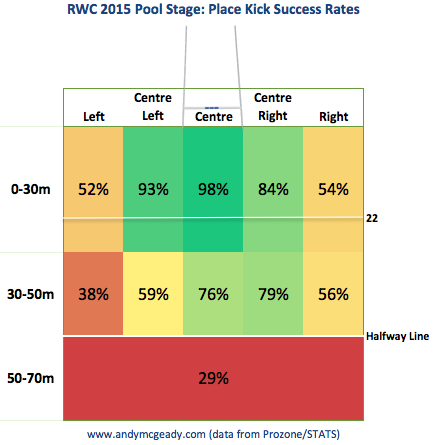RWC 2015 Kicking Data. And how I’m hopelessly biased.
Big Paul O’Connell did not go quietly into the night. A ferocious final forty minutes of test rugby that ended in him being carried off the battlefield. Probably appropriate. And to a huge ovation from all present in that wonderful Cardiff stadium. Plenty of rucks hit, based on Prozone‘s data. Twenty-six in just one half of rugby.
His final forty, as many were sure it would be.
We knew it was bad.
We knew O’Mahony was bad too.
Seeing Sexton going off had not been good either, but between him motoring off to the sideline under his own steam and Ian Madigan bouncing on to immediately knock over a nice penalty effort things had seemed, well, ok.
I used some Prozone/STATS data to put together a heatmap of RWC kicking success rates from the pool stages. You might find it interesting. It’s split into relatively large chunks in order for it to be somewhat useful. But I’d still advise to use this with caution. A few hundred kicks over 40 games might seem like a lot but there’s still a sample size warning is in place here.

Then the train home, and the tape doing the rounds of Sean O’Brien giving Pascal Papé a bit of a slap in the ribs. The big Frenchman did not take it well, and the Tullovian will serve a one match ban for being very silly indeed.
No point whining. These are challenges that a team with lofty ambition must overcome.
Published in the print edition of the Irish Times on Wednesday, October 14th, 2015.
A slap, or a stupid assault. As the clock ticked from 29 to 30 seconds in the Millennium Stadium, was Seán O’Brien deliberately provoked into swinging an arm into a French man’s midriff? When viewing the tape, did you have sympathy for the Irishman or his opponent?
This column could offer a view on the subject but it would doubtless be biased. The 1954 paper ‘They Saw A Game’ examined the perceptions of what people see when viewing a sporting event. The game in question was a college football meeting of Princeton and Dartmouth in 1951. At this point in American football’s history, the first Super Bowl had not yet taken place and wouldn’t until 1967 – although at the time it would be dubbed the ‘First World Championship Game’. In the early 50s, college ball was all.
It was a particularly violent game with stars injured. And, of course, the various scribes and witnesses from both sides had their own views on what they had seen. Nothing new there, one might think.
But the reports were in such opposition that Albert H Hastorf and Hadley Cantril wrote a paper on the differing perceptions of Princeton and Dartmouth supporters of the event based on student answers to questionnaires. The conclusion was that even after being shown the same tape of the match each student saw their own, entirely different game.
We perceive through our own lens, filtering things in a certain way based on what is important to us. A citing commissioner’s warning for O’Brien might have seemed quite appropriate to some Irish eyes. Only a slap, after all. To other eyes, it was an obvious ban given that it was a flagrant assault on an opponent.
No matter what one’s perception might have been, the sight of Jonathan Sexton shipping two hits in quick succession leaving him unable to continue could only have been judged a major blow. He’s a fine kicker, but that’s not what makes him a world-class outhalf.
On the whole, Irish kickers performed just as ably in the pool stage, trotting along at a little below the average for tier-one sides. Ian Madigan would jog on, all bounce and barnet. Given the angle and distance, his immediate penalty attempt was no gimme. Tougher still when coming in cold. To the relief of that green army in the stands, he struck it true.
Kicking from angle and distance is not straightfoward. But in the central parts of the field from relatively close range (under 30m) the top kickers are very accurate…
Read more: http://www.irishtimes.com/sport/ireland-s-breakdown-strategy-faces-ultimate-stress-test-1.2390555
